
Automated texting, the newest advancement in guest messaging for hotels, has been revolutionizing the hospitality industry, building upon this essential aspect of guest service.
In a recent study published by Hospitality Technology, an overwhelming 73% of respondents favored using mobile devices for activities like making reservations and interacting with hotels, highlighting the growing significance of mobile technology in the hospitality industry. This trend underscores the importance of exploring how text messaging automation can enhance the hospitality business, a focus we will delve into in this article.
How can hotels use automated text messaging?
Text messaging has evolved beyond mere reservation confirmations to become a powerful tool for enhancing guest experiences and driving revenue growth in the hospitality industry. Over 70% of hotel guests have indicated experiencing positive outcomes from personalized services.
Text messaging automation in hospitality refers to automated, scheduled, or event-triggered SMS communications, distinct from manual, real-time texting. This approach streamlines guest interactions, providing efficient and consistent communication tailored to the hospitality sector‘s unique needs.
Next, we’ll delve into how hotels can effectively utilize a hospitality text messaging system. We’ll cover everything from personalized booking processes to managing real-time guest requests, showcasing how this technology can revolutionize hotel operations and guest communication.
SMS solutions can be used to request feedback, follow up with reluctant customers, or pacify dissatisfied customers. Texting software can also be used to improve internal communication. Here’s how you can use the two-way text messaging services for your hotel:
Send offers instantly
With the mass texting feature you can instantly send hotel offers, discount codes, and vouchers to your customers. This will lead to increased revenue and more opt-ins to your text subscriber list.
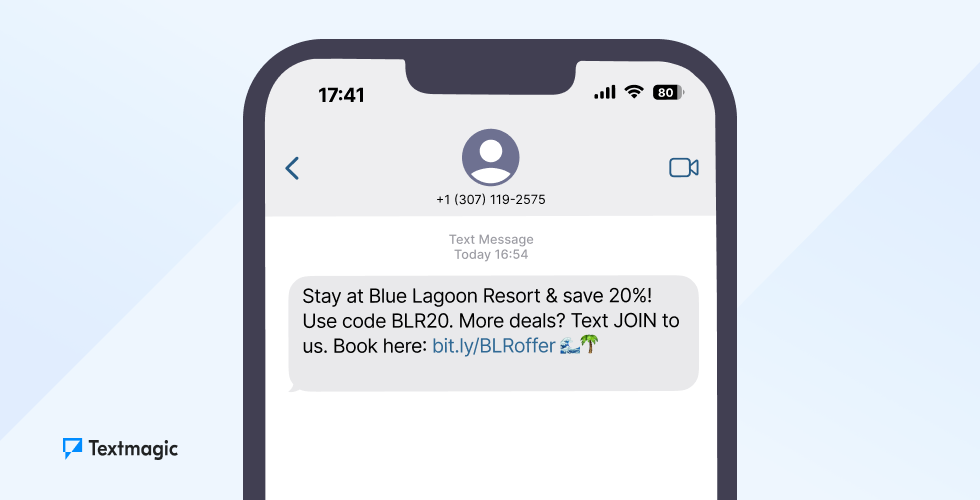
Reduce the amount of negative reviews
Text messaging can be a good way to prevent negative reviews. A friendly reminder or a helping hand from hotel personnel should alleviate a conflict.
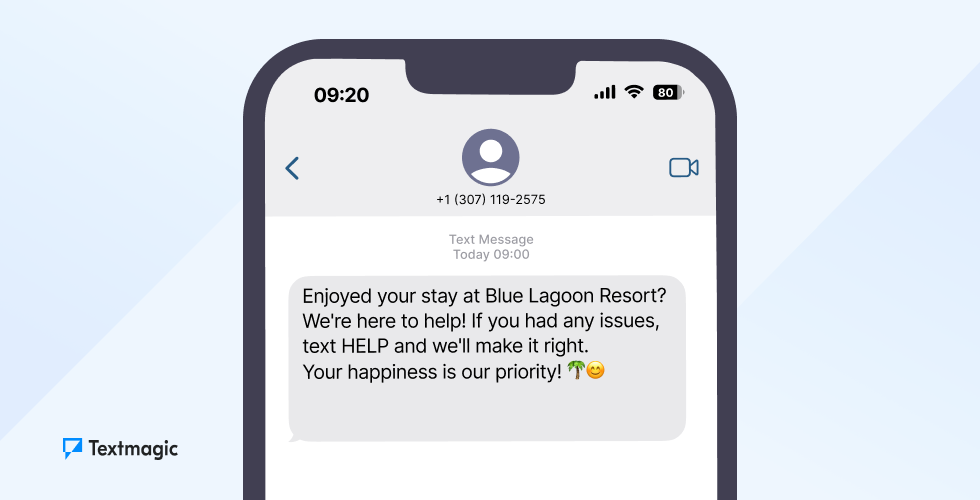
Send booking reminders
Remind your customers of upcoming hotel bookings with personalized text messages. This will make them feel cherished and will also reduce the number of missed bookings. You can use custom fields to personalize mass texts.
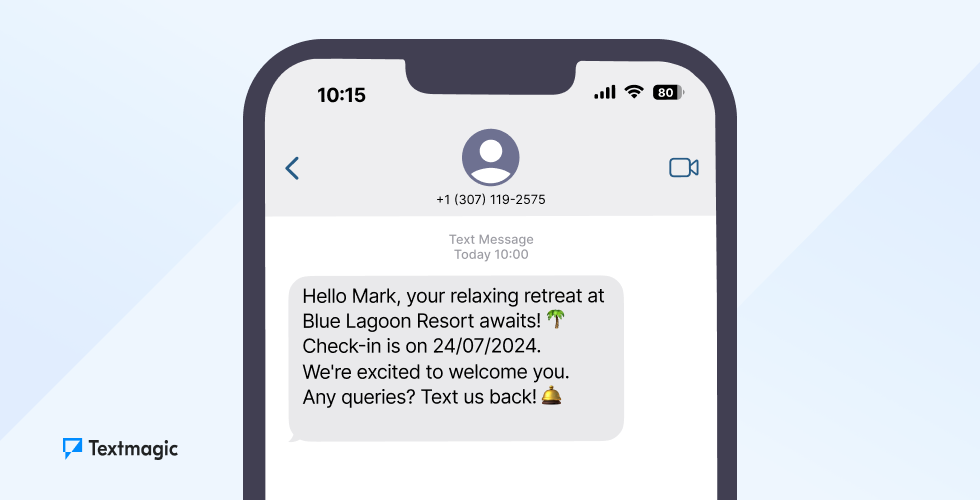
Streamline communication & customer service
SMS solutions don’t only reduce the number of negative reviews. They also streamline the efforts of your customer service department. We encourage you to use short-codes and keywords to improve two-way communication.
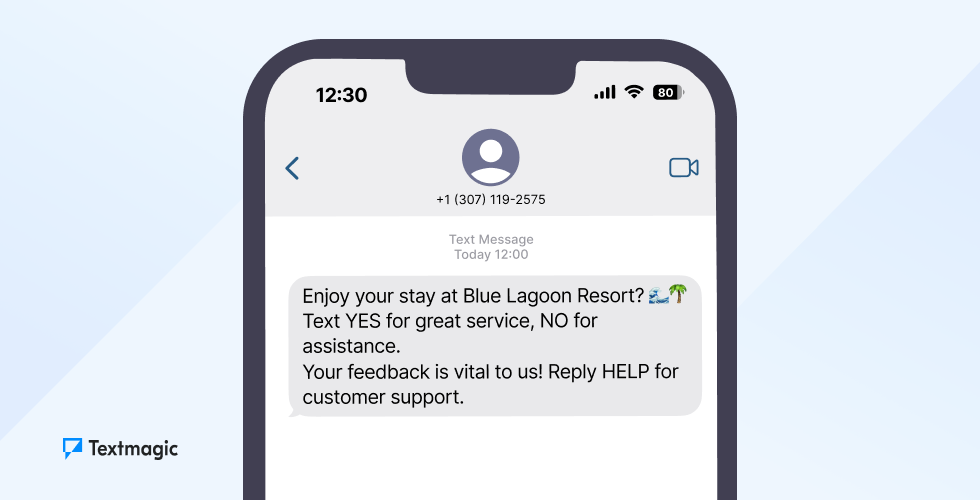
Allow room service requests
Allow guests the convenience of texting for various requests, whether it’s for more frequent room service, additional towels, extra pillows, or a later checkout, accommodating those who prefer minimal disturbance and those desiring more attentive service.
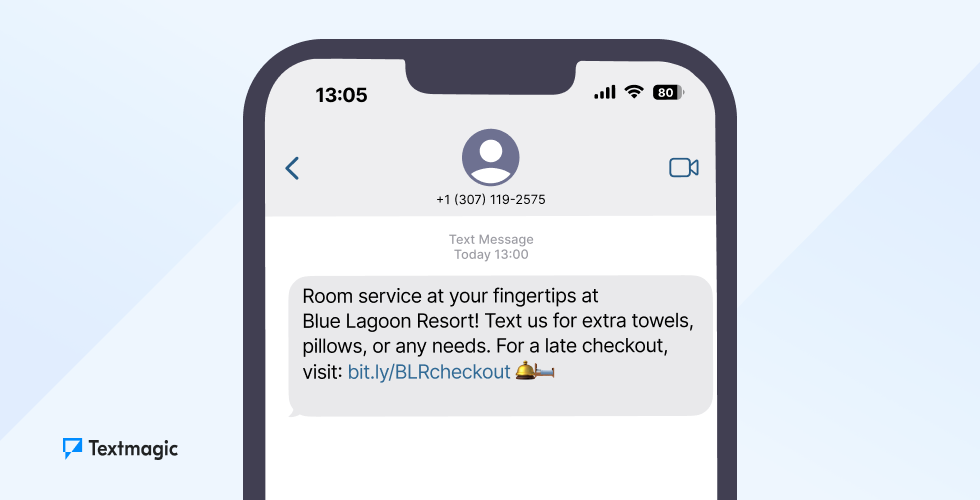
Engage customers who have opted-in
SMS text marketing for customers who have opted in to your service will improve their experience. You can send travel tips, hotel special offers, and useful information to secure their loyalty.
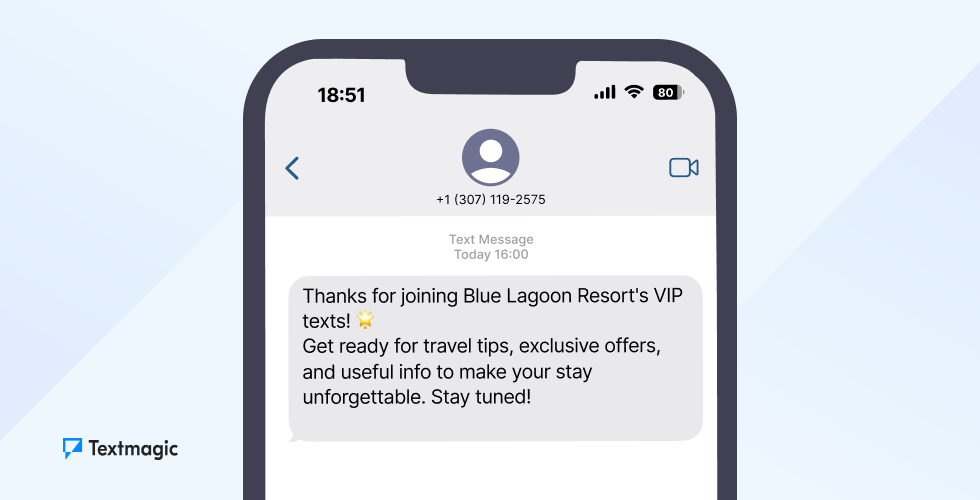
Key benefits for your hotel
If you are unsure about implementing text messaging systems in your hotel business, here are a few benefits to consider.
- Manage time for important tasks. Text messaging solutions will improve communication with staff members. You can relay policies and emergency notifications, hold employee contests and schedule changes in a matter of minutes with business texting software like Textmagic.
- Boost revenue. Two-way communication and SMS customer service will improve the experience of your customers. This can lead to positive reviews from clients, who will encourage their friends to come to your hotel. Ultimately, this will result in higher revenue.
- Offer amazing services. Imagine that you are a customer en route to your hotel. You receive a heartfelt message from the welcoming hotel team. When you leave, you receive a thank-you text. This is the perfect example of superb customer experience that you can provide with texting.
- Free up funds. Hotels have to manage with limited budgets, but phone bills can really pile up. SMS solutions will help you free up funds that you can invest in other places.
- Nurture loyal customers. Send texts with hotel discount codes or your best offers to loyal customers. This will persuade more customers to sign up to your SMS subscribe list.
- Increase productivity. Text messaging software makes it easy to consolidate requests and complaints into a single list, making them easier to track and, ultimately, improving your team’s productivity.
- Integrate with other hospitality systems. Text messaging automation’s integration with booking and CRM systems, along with other digital hospitality tools, streamlines operations and enhances guest service by enabling personalized, timely communications and reducing manual efforts.
- Collect and analyze data. Leveraging text messaging for collecting guest feedback and preferences boosts service quality. Analyzing this data aids in strategic planning and marketing, enhancing decision-making and guest satisfaction.
Useful SMS templates for hotels
SMS solutions have a variety of applications for the hospitality industry. Below are a few examples of SMS templates that you may want to use.
1. Welcome messages
Welcome to [Hotel Name]! We’re thrilled to have you with us. For any assistance, simply text this number. Enjoy your stay and let us make it memorable!
2. Booking confirmations
Hello [First Name],
Your reservation at [Hotel name] is confirmed. For more details on your booking please visit [Link]. See you soon! 🏨✨
3. Mobile brochure
Explore all that [Hotel Name] has to offer! Check out our mobile brochure for info on amenities, dining, and activities: [Link]. Plan your perfect stay with us! 🌅📲
4. Special discounts
Good news, [First Name]! 🌟 As a valued guest of [Hotel Name], enjoy 20% off your next stay. Use code 20GDAY at booking. Valid till [Date]. Book now: [Link] 🏖️
5. Reservation reminder
Just a friendly reminder from [Hotel Name]: Your reservation is coming up on [Date]. We’re excited to host you! Need to modify your stay? Just text us back. 🗓️🛎️
6. Room service reminder
Cleaning staff will be replacing towels between [Time]. Reply to this text message with SHEETS if you’d also like your sheets changed.
7. Complimentary drinks
Welcome to [Hotel Name]! Enjoy complimentary welcome drinks on us. Redeem at our poolside bar with this message. Cheers to a memorable stay! 🍹
8. Booking discounts
Book now at [Hotel Name] and save 15%! Use code BLR15 at checkout. Limited time offer. Plan your dream getaway today! 🌊🏨 [Link]
9. Lost clients
Hello [First name],
We miss you at [Hotel name]! Book one night with us and get the second night free. Call [Phone] to book. Offer ends in 30 days.
10. Check out texts
[First Name], we hope you enjoyed your stay with us. Your bill [Reference ID] has been paid in full. We look forward to seeing you again! [Hotel name]
How can Textmagic help with hospitality text messaging?
Hotel text messaging with Textmagic is straightforward and efficient. Here’s how it works:
- Activate Textmagic on your current number: Easily integrate text messaging with your existing number – yes, even landlines. Calls continue as usual, while texts are directed to the Textmagic platform.
- Promote your text messaging service: Once your Textmagic account is active, spread the word. Advertise your number on your website, in-room materials, menus, and signage, letting guests know they can conveniently text for services.
- Guests send text requests: Guests simply text their requests for additional services or bookings, just as they would text a friend.
- Manage requests on the dashboard: Receive texts instantly on your Textmagic dashboard, accessible from both your computer and the Textmagic mobile app for iOS or Android.
- Respond and fulfill requests: Quickly reply to guest texts, confirming their requests. The platform’s sorting options help prioritize urgent or recent messages.
With Textmagic, guests’ needs are met with a simple text, enhancing staff efficiency and elevating guest satisfaction, making it a go-to solution in the hospitality industry.
Sign up for Textmagic today!
Case study: Driftwood Bed & Breakfast
Driftwood Bed and Breakfast is a boutique accommodation situated in the heart of Mission Beach, Australia. When establishing their booking calendar, the owners wanted to be notified of bookings instantaneously, even outside office hours.
Textmagic’s SMS platform made it possible for Driftwood B&B to be notified of bookings as they happen, on a single mobile device.

Business challenge:
- Needed instant booking notifications from Freetobook and a way to remotely offer specials for repeat business.
Textmagic’s solution:
- Provided automated booking alerts from the website and various booking engines to a single phone, creating an efficient, time-stamped booking record.
Results:
- Driftwood Bed & Breakfast exceeded occupancy projections since March 2015, achieving 61.69% against a 38% forecast.
- Textmagic offered cost-effective communication, leading to savings and streamlined accounting.
Introducing new software to your hotel is a significant choice, and we aim to make the process as seamless as possible. Experience all our features with a free trial, with no obligations.
Conclusion
Offers and promotions are key to boosting hotel bookings, yet the efficacy of marketing channels is evolving. With 85% of international tourists carrying mobile devices, SMS marketing is becoming a standard for effective promotion and streamlined booking in the hotel industry.
Hospitality text messaging systems offer integrations with property management platforms, enable inter-departmental communication, and provide automated responses to common questions, simultaneously enhancing operational efficiency and guest satisfaction.
Enhance your hotel’s text messaging system to enjoy the dual benefits of increased guest satisfaction and improved staff efficiency.
Related articles
When texting emojis in your business communication is a good idea?
For many people, emojis have become a part of daily ...
Text message marketing and database maintenance
In our increasingly connected world, text message ma...
The automated text message: All you need to know about the what, why, and how
Let’s face it, automation is the ever-ruling king. I...
Why your texts are not sending or getting delivered and how to fix it
It is one thing to develop an effective SMS marketin...
A quick guide to conversational marketing for business
Conversational marketing is rapidly becoming a must-...




